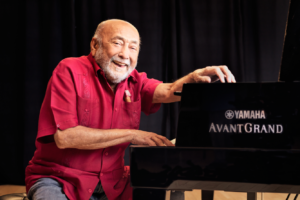Latin-music pianist and bandleader Eddie Palmieri recorded his two-volume album set “Live at Sing Sing” in the early winter of 1972 — 50 years ago this year. Before an enthusiastic audience of mostly Black and Latino inmates, the event’s emcee, radio DJ and native Puerto Rican Francisco “Paquito” Navarro, spoke to the politics of their performance in the sequestered confines of the New York State Department of Correction.
“For all mankind!” he shouted over the courtyard loudspeaker, saying there should be “no walls,” “no fears” and “only one thing in life: liberty in the coming years.” Palmieri’s show at Sing Sing reflected a moment when popular discourse around systemic oppression had reached peak levels in the cultural mainstream, just as many Americans were first encountering an exciting, aggressive and youth-driven Latin music genre — salsa. Socially conscious musicians of that era, in expressing prisoner solidarity — or simply acknowledging prisoners as human beings worthy of love, empathy and entertainment — raised public awareness about prison conditions and critiqued mass incarceration as an unconscionable stain on U.S. society. This work continues today.
Not by coincidence, Palmieri’s performance at Sing Sing, Upstate New York’s notorious maximum-security men’s correctional facility, emerged on the heels of the Attica prison riot of September 1971, also in Upstate New York — an event became a flash point in modern U.S. history. More than 1,200 inmates seized control of the prison in a four-day standoff. In a manifesto, the prisoners called on the state to recognize their most basic human rights, including legal representation and adequate medical attention. Gov. Nelson Rockefeller (R) refused their demands and ordered the state police to “retake” the prison. The resulting assault left 10 hostages and 33 prisoners dead and more than 100 wounded.
Palmieri, a Bronx-born Nuyorican already immersed in the politics of social and racial justice, was expanding his activist focus to the plight of the incarcerated. Bemoaning the “barren creativity” of contemporary Latin musicians, Palmieri told Billboard magazine in May 1973 that he was conscientiously bound to continue performing free prison concerts, insisting that the imprisoned should be “given a chance to grow” and “not just stagnate in their cells.” Palmieri also played gigs at Rikers Island and Attica (twice) and continued playing prisons throughout the decade.
